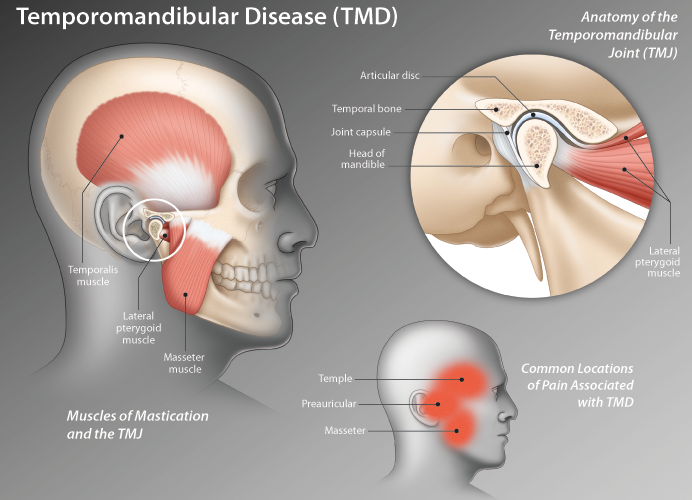Temporomandibular Disorders (TMJD)

End TMJ Discomfort
Temporomandibular joint disorders (TMJ disorders) are a group of conditions that affect the temporomandibular joint (TMJ), the hinge-like joint that connects your lower jaw to your skull. This joint plays a crucial role in various functions, including chewing, speaking, and yawning.
When the TMJ or the surrounding muscles and ligaments become inflamed or damaged, it can lead to a range of symptoms, including:
- Pain: Aching or sharp pain in the jaw joint, face, neck, or ear.
- Tenderness: Sensitivity to touch in the jaw joint or surrounding muscles.
- Stiffness: Difficulty opening or closing your mouth, or limited jaw movement.
- Locking: The jaw may become locked in an open or closed position.
- Clicking or popping: Sounds may be heard when opening or closing the mouth.
- Headaches: Frequent headaches, especially in the temples or forehead.
- Ear problems: Ringing in the ears, ear pain, or a feeling of fullness in the ears.
It’s important to note that not all clicking or popping sounds in the jaw joint indicate a problem. Many people experience these sounds without any pain or discomfort.
What We Offer
We offer a range of effective treatments for headaches, including:
Physical therapy
Eases muscle tension, improves flexibility, and enhances range of motion, promoting recovery and reducing discomfort from muscle strain.
Trigger point injections
Relieves pain by directly targeting muscle knots, releasing tension and improving movement in affected areas for lasting relief.
Laser therapy
A painless, non-invasive treatment that reduces inflammation, speeds healing, and alleviates symptoms of chronic and acute conditions.
Nightguard/ Splint
Protects teeth from grinding, alleviates jaw pain, and prevents TMJ strain by keeping the jaw in a relaxed position during sleep.
Understanding TMJ Disorders
Arthritis: Joint inflammation, including osteoarthritis or rheumatoid arthritis, can affect the temporomandibular joint (TMJ), leading to pain and dysfunction.
Autoimmune Disease: Conditions like lupus or scleroderma can affect the TMJ, causing pain or joint damage.
Long Dental Procedures: Prolonged mouth opening during dental work can strain or overstretch the TMJ, leading to discomfort or pain.
Overstretching the Mouth: Excessive stretching, such as during yawning or biting large objects, can stress the TMJ and cause discomfort.
Injury: Trauma to the jaw, face, or head, such as from accidents or sports injuries, can damage the TMJ or its surrounding structures.
Intubation: Medical procedures involving intubation can overstretch the jaw and TMJ, sometimes resulting in joint pain or dysfunction.
Infection: Infections in the jaw or ear can spread to the TMJ, leading to inflammation and pain.
Clenching: Chronic jaw clenching or teeth grinding (bruxism) puts pressure on the TMJ, leading to muscle strain and joint problems.
Genetics: Some people may be predisposed to TMJ disorders due to their genetic makeup or jaw structure.
Symptoms of TMJ disorders may include:
- Pain or tenderness in the jaw joint or the muscles that control jaw movement.
- Aching pain in the face, neck, or ear.
- Difficulty opening or closing your mouth.
- Locking of the jaw.
- Painful clicking, popping, or grating sounds in the jaw joint.
- Headaches, ringing in the ears, dizziness.
Degenerative joint disease: Wear and tear of the TMJ joint.
- Physical therapy: To improve jaw movement and muscle function.
- Medication: To manage pain and inflammation.
- Surgery: In severe cases, to correct underlying issues.
If you experience any of these symptoms, it’s important to consult a dentist or healthcare provider for proper diagnosis and treatment.
Diagnosis And Lock Jaw Treatment
TMJ disorders are still a relatively unexamined area of medicine, and as such, diagnosis and treatment of these conditions can be difficult. There is no standard accepted test for diagnosing TMJD. A thorough evaluation along with required testing and X-ray imaging is needed to arrive at a possible diagnosis.
Various treatment options include
- Physical Therapy
- Medication as needed
- Trigger point injections
- Orthotic Splints
- Habit / Lifestyle Modification.
Night Guards for TMJ: A Comprehensive Guide
A night guard, also known as a mouthguard or occlusal splint, is a custom-fitted dental appliance designed to protect your teeth and jaw from the effects of bruxism (teeth grinding or clenching). While they are commonly used to prevent tooth wear and damage, night guards can also be beneficial in managing temporomandibular joint (TMJ) disorders.

Custom-Fitted Design
A night guard is specifically designed to fit your mouth perfectly, ensuring optimal comfort and effectiveness.
Reduces Jaw Muscle Tension
By preventing teeth grinding and clenching, night guards can help relax the jaw muscles and alleviate pain associated with TMJ disorders.
Protects Teeth
Night guards act as a barrier between your teeth, preventing wear and tear caused by bruxism.
Contact Us for Consultations
We manage chronic orofacial pain and dental sleep disorders like snoring and sleep apnea with a multidisciplinary approach to enhance patient outcomes.

